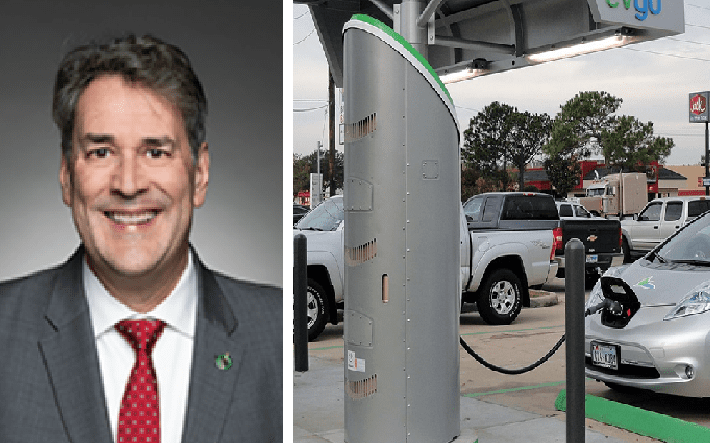Halifax, Nova Scotia — If you’re wondering how to get the word out that your collision centre is capable of repairing electric vehicles, a great first step is installing some Level 2 charging stations, according to David Giles, EV training coordinator for Consulab and founder of PoweredEV Consulting.
Giles believes that businesses capable of handling EV claims could seriously benefit from adding charging stations in a visible area of their property, as the presence of these chargers sends a clear message to EV owners who might be passing by.
“[Having EV chargers on-site] sends a clear message to customers. It signifies your commitment to electric vehicles and shows your dedication to serving EV owners. There’s not a lot of marketing required when it’s done the right way.”
He added that businesses with charging stations and clear EV affiliation can advertise on social media with more success.
“You could join an EV owner Facebook group and simply make a post informing members that they work on EVs…but it could be seen as an ad and get deleted. If you post something saying, ‘We just installed some EV chargers on-site to service customer vehicles more effectively! Come see us for all of your EV repair needs,’ you have a clear affiliation with electric vehicles and it’s portrayed as an update rather than an advertisement.”
Further, the presence of your own Level 2 charger allows a business to streamline some processes related to EV damage.
“Sometimes, in a collision event, there’s damage in that high voltage battery. You might be required to securely store the vehicle in the meantime. Having a charger on-site means you have the opportunity to monitor and manage battery health.
“Plus, after the repair is complete, having that easy access to a charging station means you can verify the battery status and validate it still holds a charge.”
Not to mention that charging stations could allow you to add an extra “oomph” to your customer service.
“It’s like cleaning a customer’s car or detailing it after a repair. If you recharge their vehicle for pick-up, your customer service is going that extra mile.”
As for the maintenance aspect, Giles said Level 2 Charging Stations require “virtually zero maintenance” if used properly. Rather, it’s more about diligence and keeping things under control.
“There are some Level 2 stations where you need a key to operate the charger. So, it won’t charge unless the technician has the control key. That way you’re not dealing with someone rolling in at 2 a.m. using your business’s charger.”
Giles said the cost of such chargers may be surprising to some, adding that he saw a $1,500 unit just the other day in a flyer.
“It’s a fairly cheap investment—you could spend more on other marketing efforts that aren’t nearly as effective.”
Giles said he recently received a call from a local friend who owns a glass centre. He was keen to get the word out that his facility handles Tesla glass claims—so Giles advised him to install some chargers in a visible area out front.
“It worked!” he said.
If you’re asking yourself if adding a public charging station to your property is a good business venture, Giles would advise against it.
“It would be a high cost with not a great return on investment, plus some big time constraints in some areas. Even with Level 2, open-to-the-public chargers—there’s not enough monetary value to make it worthwhile.
“Installing Level 2 chargers, though—I totally believe the value in that.”



















